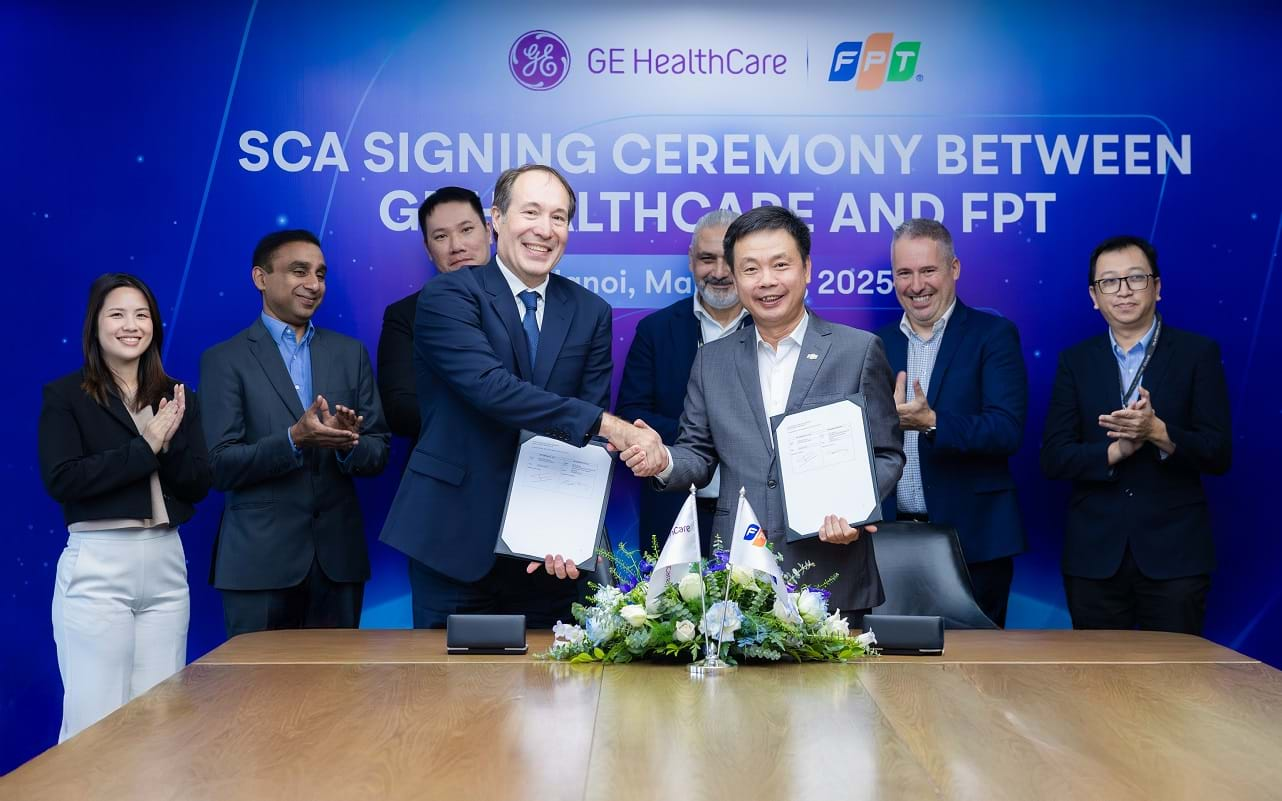FPT and partners collaborate to implement the smart governance model at the Ho Chi Minh National Academy of Politics
•
19/09/2024
As part of the 75th-anniversary celebrations of the Ho Chi Minh National Academy of Politics (HCMA), the Academy recently held the opening ceremony for its "Smart Governance Model," marking the beginning of a comprehensive digital transformation aimed at enhancing cadre training towards a digital government framework. FPT Corporation and its partners are honored to have played a critical role in implementing this significant Project.
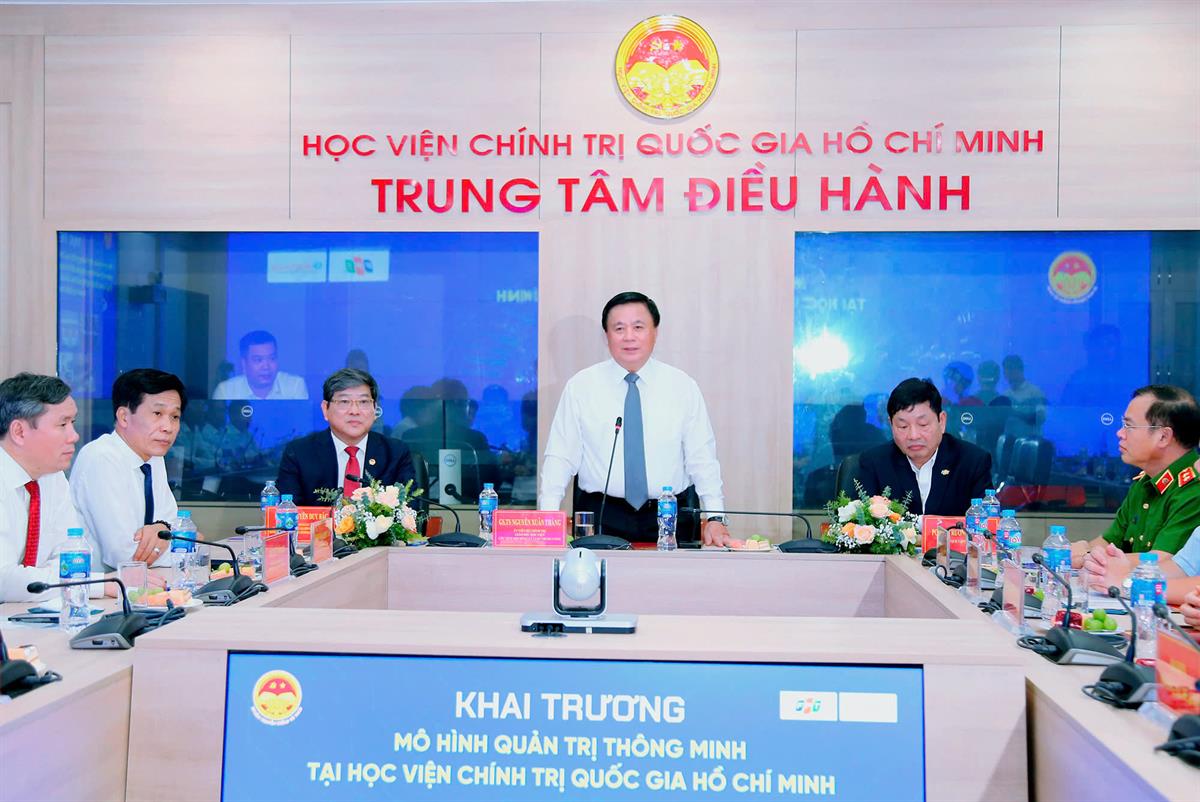
Prof. Dr. Nguyen Xuan Thang, Politburo member, Director of the HCMA, and Chairman of the Central Theoretical Council, delivered a speech at the opening ceremony.
The event featured speeches by Mr. Nguyen Xuan Thang, Politburo member, Director of the HCMA, and Chairman of the Central Theoretical Council, along with other key leaders from the Party and State. Senior officials and representatives from various ministries and agencies, including the Ministry of Public Security, Ministry of Industry and Trade, Ministry of Planning and Investment, State Audit, Government Cipher Committee, and the Project 06 Working Group, also attended the ceremony.
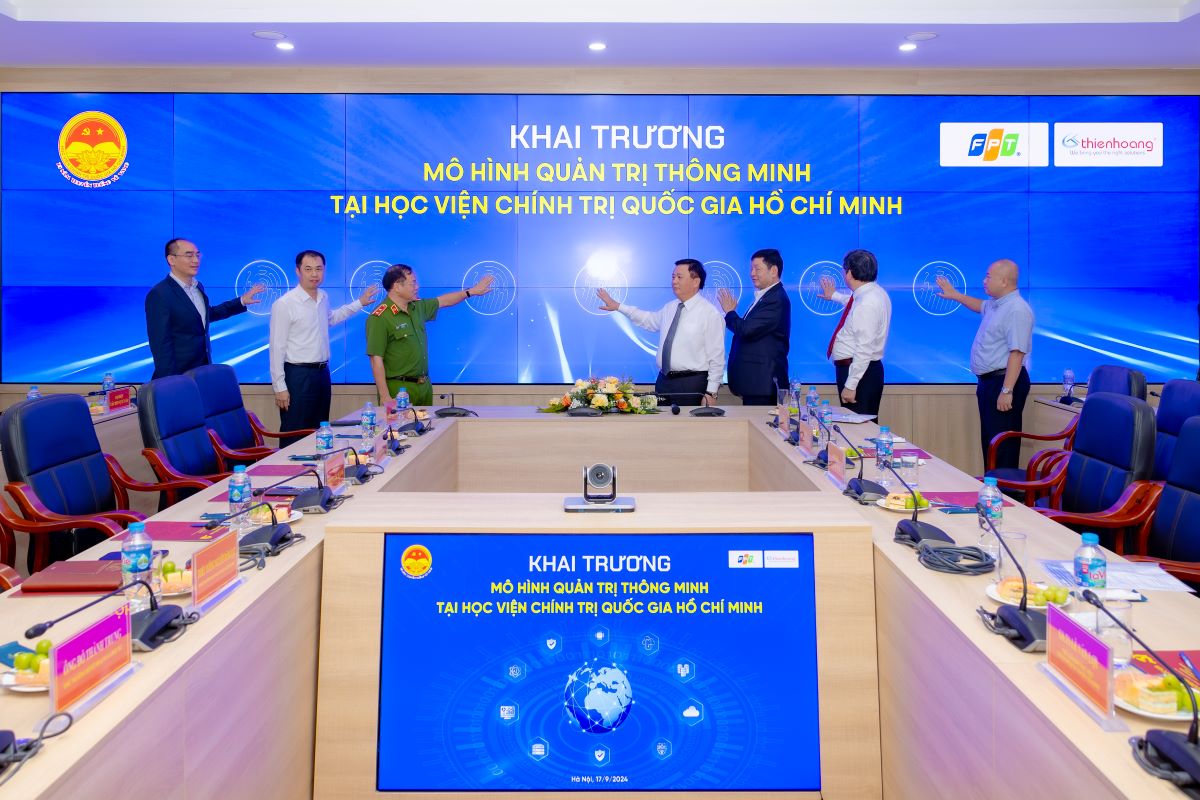
Prof. Dr. Nguyen Xuan Thang, alongside other distinguished delegates, officially launched the Smart Governance Model at the HCMA by pressing the launch button.
The Smart Governance Model Project at the HCMA, kicked off in early 2024, aims to build a comprehensive digital transformation platform for unified management across the Academy and its affiliated units. By leveraging cutting-edge technologies, the Project seeks to boost administrative efficiency, streamline operations, and enhance teaching quality, all while prioritizing information security and safeguarding data integrity throughout the Academy's entire system.
The Project is part of the 2020-2025 medium-term public investment plan approved by the National Assembly and the Government, with involvement from key agencies such as the Ministry of Public Security, the State Audit, the Ministry of Planning and Investment, and the Ministry of Information and Communications. Key elements of the initiative include investment in facilities, technical infrastructure, and the development of smart software infrastructure and databases to support the entire Academy system—comprising the Central Academy, Regional Political Academies I, II, III, IV, and the Academy of Journalism and Propaganda. Notably, the FPT IS consortium and its partners are tasked with delivering two crucial components: the investment in technical infrastructure and the development of the smart governance model.
At the ceremony, Mr. Nguyen Duy Bac, Deputy Secretary of the Party Committee and Permanent Deputy Director of the Ho Chi Minh National Academy of Politics, who also serves as the Head of the Project Management Board for the Smart Governance Model, reported on the Project's progress. He highlighted that after nearly three years of investment preparation and almost nine months of continuous construction, the Project has reached a critical phase. Due to the strong leadership of the Party Committee, the Academy's leadership team, and the coordinated efforts of various ministries, departments, agencies, and contractors, the foundational and most crucial components have been completed. The Project is now transitioning into the practical implementation stage, marking a significant step in the Academy's management and operations through comprehensive digital transformation across all its functions.
The Project's implementation process has received support and thorough appraisal from vital governmental bodies, including the Ministry of Information and Communications, the Ministry of Planning and Investment, the Ministry of Public Security, and the State Audit. Internal units of the Academy, such as the Department of Planning and Finance and the Information Technology Application Center, have worked closely with related entities and consulting contractors to ensure all bidding packages align with the contractor selection process.
On the infrastructure side, the Project has equipped the Academy with a state-of-the-art system, including six hyper-converged servers, advanced storage systems, and a secure network meeting level 3 information security standards at the Data Center. The LAN and Wi-Fi systems have been upgraded across all facilities, ensuring high-speed internet connectivity and an online conference system. Additionally, a dedicated operations center, network administration room, two computer labs, a studio, and a large-screen hall have been established, providing the Academy with a solid technological foundation to optimize management, teaching, and research activities.
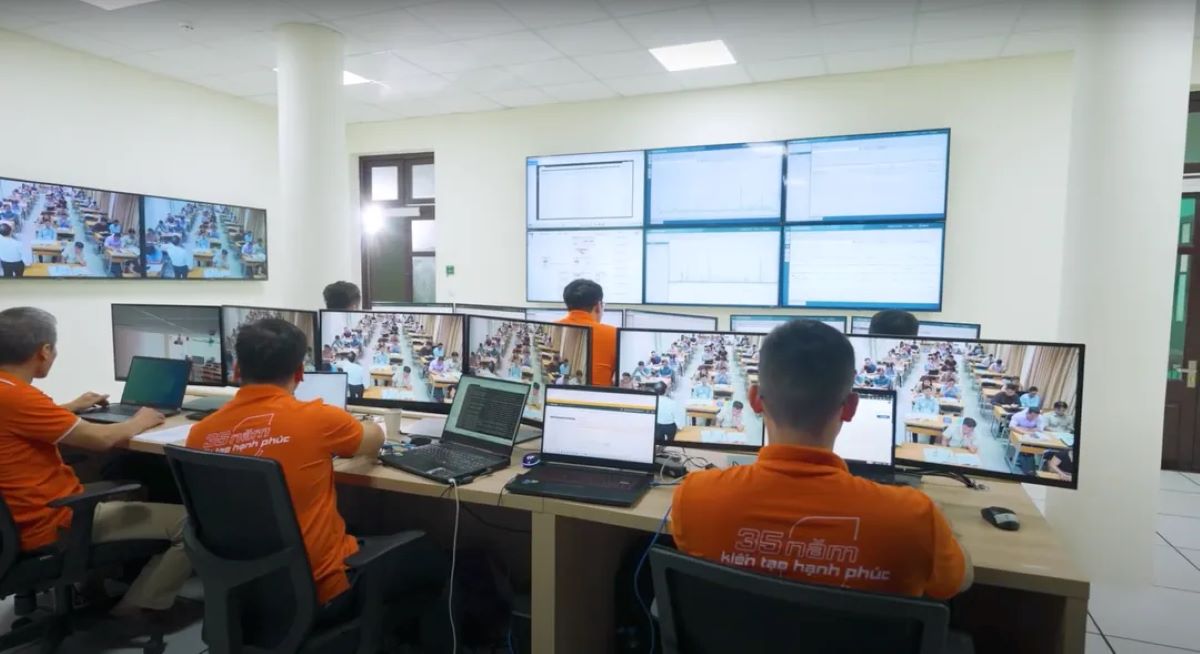
Management model applies state-of-the-art technologies and solutions.
On the software front, the Project has developed 13 internal platforms designed to comprehensively support the Academy's operations. These range from management tools for day-to-day operations and training to systems for online learning, exams, scientific management, and administrative functions. Additionally, two mobile apps have been created specifically for lecturers and students. The operational management software facilitates seamless document processing, work management, and administrative record tracking, ensuring integration between the Central Academy and its regional branches. The training management system streamlines the entire process — from enrollment to classroom administration — while utilizing AI-powered cameras for classroom monitoring, enhancing teaching and student progress tracking. The scientific management software coordinates research efforts, from planning and evaluation to publication, helping streamline academic output. Other supporting platforms, such as software for multiple-choice testing, ensure transparency and precision in managing the training process. These software solutions form the foundation for advancing the Academy's digital transformation, elevating its overall management, teaching, and research capabilities.
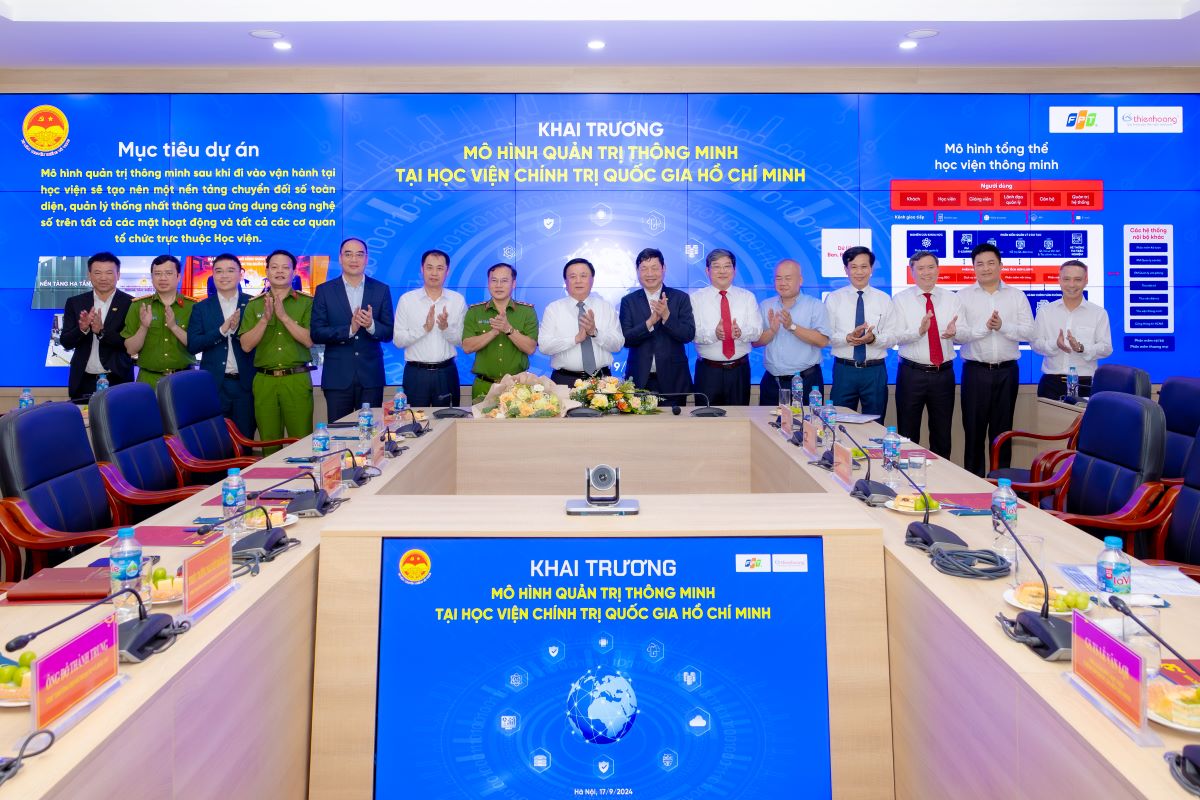
The opening ceremony of the "Smart governance model" at Ho Chi Minh National Academy of Politics.
At the ceremony, Mr. Nguyen Xuan Thang, Politburo member, Director of the HCMA, and Chairman of the Central Theoretical Council, expressed his appreciation for the Project's accomplishments, stating: "The project 'Smart Governance Model at the Ho Chi Minh National Academy of Politics,' funded by the Party and State and initiated in 2024, is a landmark effort in celebration of the Academy's 75-year legacy of excellence. This initiative represents a comprehensive digital transformation across all facets of the Academy, reinforcing its role and stature. It also serves as a model for leveraging digital technologies to create a future-oriented digital academy, aligned with the Party and State's digital transformation strategy and meeting the demands of Industry 4.0 and international integration."
Representing the Project's partners, Mr. Truong Gia Binh, Chairman of FPT Corporation, remarked: "Digital transformation is reshaping Vietnam's position on the global stage, creating new production models, and the Smart Governance Model at the Ho Chi Minh National Academy of Politics exemplifies this strategy in action. FPT and its partners are honored to collaborate with the Academy to implement crucial infrastructure and software systems. With this modern, integrated IT platform in place, the Academy can efficiently manage operations, training, research, and teaching across its entire system. This milestone not only elevates the Academy but also stands as a point of national pride—a model of digital transformation in state institutions, driving Vietnam forward on its journey toward becoming a digital nation."
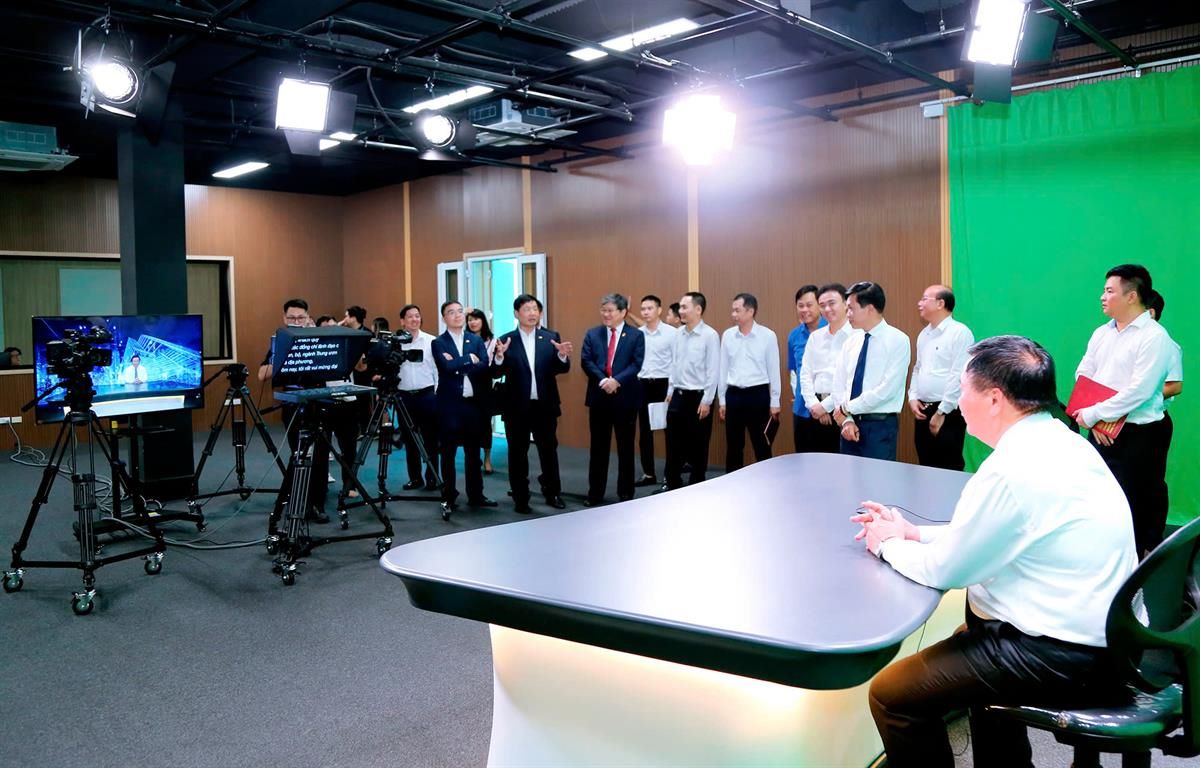
Delegates toured the system.
The Ho Chi Minh National Academy of Politics is Vietnam's premier institution for training and developing mid-to senior-level leaders, managers, and political theory experts within the Party, the State, and socio-political organizations. It also acts as a national hub for research on Marxism-Leninism, Ho Chi Minh's thought, the Party's guidelines, policies, and laws, and political science and leadership to support teaching and learning. This research is crucial in shaping the Party and State's policy framework. The launch and operation of the Smart Governance Model represent a pivotal step in laying a solid foundation for digital transformation across state agencies, reinforcing confidence in Vietnam's journey toward becoming a digital nation.




